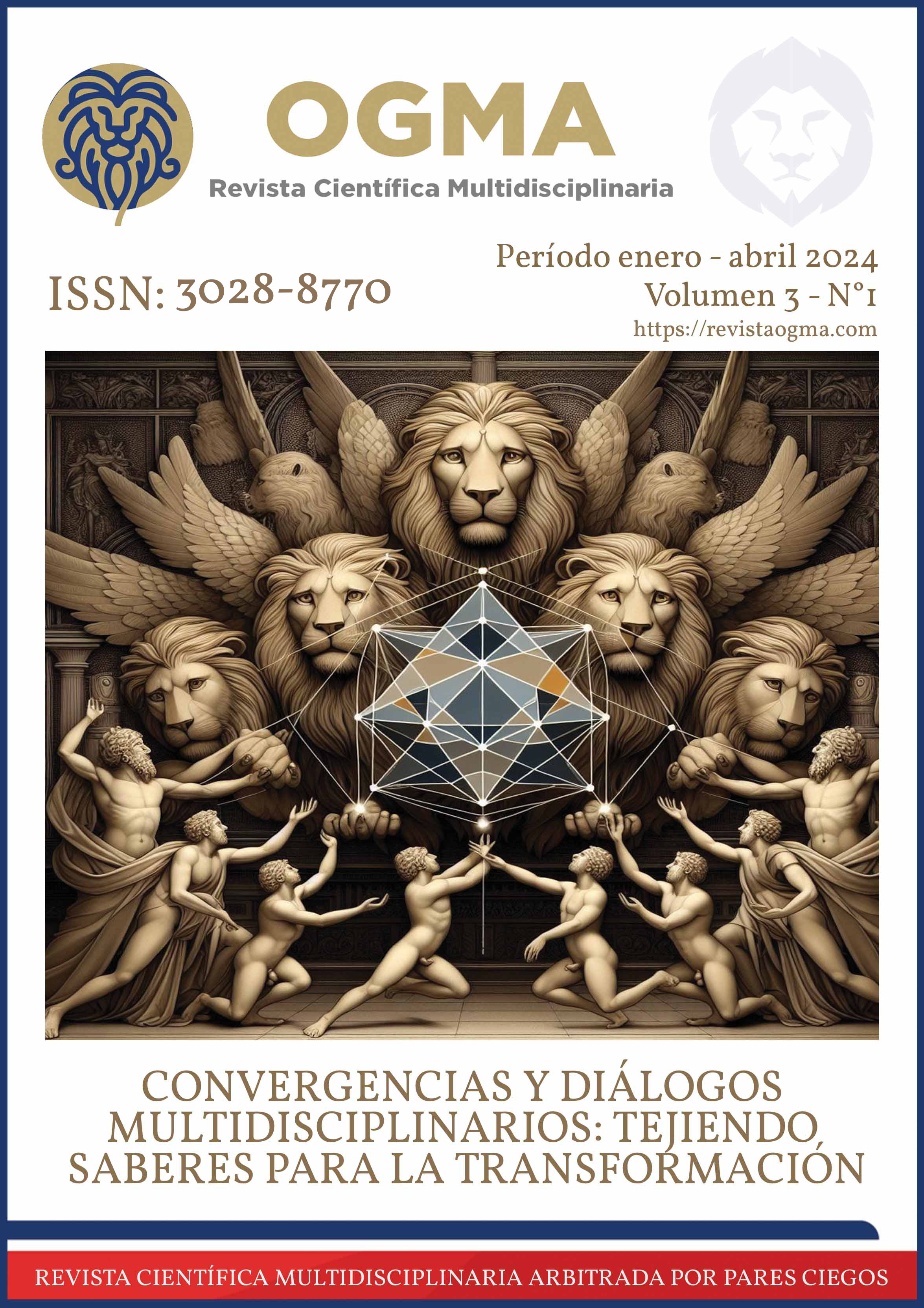Neurodevelopment and adhesion of emotional, social and communicative competencies in infancy and early childhood
Keywords:
Education, Teaching, Pedagogical practice, Life skillsAbstract
The essay delved into the impact of neuroscience in early childhood education, highlighting the influence of emotional and cognitive development in the learning process. The objective is to analyze the importance of neurodevelopment and the attachment of these competencies in the first years of life The various stages of human development, from infancy to early adulthood, were addressed, highlighting how these stages influence the acquisition of competencies. The importance of fostering emotional and social competencies in children was emphasized, and didactic strategies such as the zone of proximal development and scaffolding were proposed to achieve this. The crucial role of teacher mediation in classroom activities to create a collaborative learning environment was also underlined. In summary, the essay argued that integrating knowledge of neuroscience and emotions in educational practice is fundamental to enhance the integral development of children, preparing them to face the challenges of life.
References
Cassany, D. (2021) El arte de dar clase (según un lingüista). Editorial Anagrama. Barcelona.
Chambers, A. (2007) Dime. Fondo de Cultura Económica.
Dávila, M., Borrachero, A., Cañada, F., Martínez, G., Sánchez, J. (2015). Evolución de las emociones que experimentan los estudiantes del grado de maestro en educación primaria, en didáctica de la materia y la energía. Revista Eureka sobre Enseñanza y Divulgación de las Ciencias, 12(3), 550-564. https://www.redalyc.org/articulo.oa?id=92041414011
Dominguez, P. (2008) Destrezas receptivas y destrezas productivas en la enseñanza del español como lengua extranjera. MarcoELE Revista de Didáctica Español (6). https://www.redalyc.org/pdf/921/92152377042.pdf
Goleman, D. (1998) Working with emotional intelligence. Editorial Kairós.
Guevara López, H. (2009). Las competencias laborales en el diseño curricular de educación superior. Studium Veritatis, 7(12-13), 121–130. https://doi.org/10.35626/sv.12-13.2009.160
Harvard Business School (2016) Difficult Conversations. 20 Minute Manager Series. Editorial Reverté, S. A. https://revertemanagement.com/wp-content/uploads/2021/11/MUESTRA_Como-mantener-una-conversacion-dificil.pdf
Hederich Martínez, C. (2010). Efecto de un andamiaje para facilitar el aprendizaje autorregulado en ambientes hipermedia. Revista Colombiana de Educación, (58) 96-116. https://doi.org/10.17227/01203916.631
López-López, M. del C., León Guerrero, M. J., & Pérez García, M. P. (2018). El enfoque por competencias en el contexto universitario español. La visión del profesorado. Revista de Investigación Educativa, 36(2), 529–545. https://doi.org/10.6018/rie.36.2.314351
Martínez, P. & González, N. (2019). El dominio de competencias transversales en Educación Superior en diferentes contextos formativos. Educ. Pesqui., 45, 1-23. https://www.scielo.br/j/ep/a/3nvyrGqLggFfdrcmbrGPSbG/?format=pdf&lang=es
Martínez-Huamán, E., Quispe Morales, R. A., Gutiérrez Mendoza, J., & García Rivas Plata, C. E. (2022). Gramalote: Gobernanza climática y planificación del desarrollo en contexto. Revista Venezolana de Gerencia, 27 (Especial 7), 266-280. https://doi.org/10.52080/rvgluz.27.7.18
Mejía, C., Urrea, A. (2015). La confianza en el aula como eje transformador del mundo escolar. Sophia, 11(2), 223-236. https://www.redalyc.org/articulo.oa?id=413740778008
Navarro, R. Orozcom M. Orozco, B. Correa, M. (2009) Desarrollo infantil y competencias en la primera infancia. Ministerio de Educación Nacional República de Colombia.
Papalia, D., Feldman, R., Martorell, G. (2012) Desarrollo humano Duodécima Edición. Mc Graw Hill Education.
Pennac, D. (2009) Los derechos imprescindibles del lector. https://camargoeducacion.es/wp-content/uploads/Los-Derechos-del-Lector-Daniel-Pennac_Quentin_Blake.pdf
Ramírez, J. (2020). An Approach by Competencies and Its Current Relevance: Considerations From Occupational Guidance in Educational Context [Un Enfoque Por Competencias y Su Relevancia Actual: Consideraciones desde la Orientación Laboral en el Contexto Educativo]. Revista Electrónica Educare, 24(2), 1-15. https://doi.org/10.15359/ree.24-2.23
Riera Bravo, J. S., Castillo Miranda, M. E., Campoverde Naula, M. de la N., & Uyaguari Brito, S. M. (2023). La evaluación de los aprendizajes desde el enfoque por competencias. Ciencia Latina Revista Científica Multidisciplinar, 7(3), 9783-9803. https://doi.org/10.37811/cl_rcm.v7i3.7000
Ríos, D. & Herrera, D. (2017). Los desafíos de la evaluación por competencias en el ámbito educativo. Educ. Pesqui., 43(4), 1073-1086. http://dx.doi.org/10.1590/S1678-4634201706164230
Romero, M., Benavides, A., Fernández M,. Pichardo, C. (2017) Intervención en funciones ejecutivas en educación infantil. International Journal of Developmental and Educational Psychology. 3 (1) 253-261. https://www.redalyc.org/pdf/3498/349853365026.pdf
Roselli, M. Ardilla, F. (2016) History of child neuropsychology. Edupsykhé. Revista de Psicología y Educación. 15 (1) 5-13. https://dialnet.unirioja.es/descarga/articulo/6349991.pdf
Silva, W.H. & Mazuera, J. A. (2019). ¿Enfoque de competencias o enfoque de capacidades en la escuela? Revista Electrónica de Investigación Educativa, 21(e17), 1-10. https://doi.org/10.24320/REDIE.2019.21.E17.1981
Stelzer, F., Cervigni, M. A., & Martino, P. (2011). Desarrollo de las funciones ejecutivas en niños preescolares: una revisión de algunos de sus factores moduladores. Liberabit. Revista Peruana de Psicología, 17(1), 93-100. https://www.redalyc.org/pdf/686/68619288011.pdf
Trottini, A. M., & Ferrandi, M. A. (2018). EVALUACIÓN DE COMPETENCIAS UNIVERSITARIAS. Revista De La Escuela De Ciencias De La Educación, 2(12). https://doi.org/10.35305/rece.v2i12.316
Villa, A. (2020). Aprendizaje Basado en Competencias: desarrollo e implantación en el ámbito universitario. REDU. Revista de Docencia Universitaria, 18(1), 19-46. https://doi.org/10.4995/redu.2020.13015
Downloads
Published
Issue
Section
License
Copyright (c) 2024 Multidisciplinary Scientific Journal Ogma

This work is licensed under a Creative Commons Attribution-NonCommercial-ShareAlike 4.0 International License.

